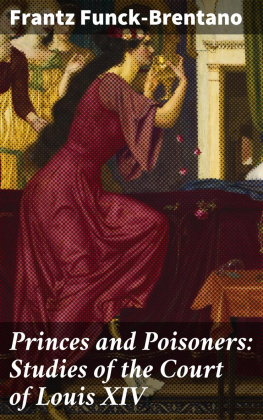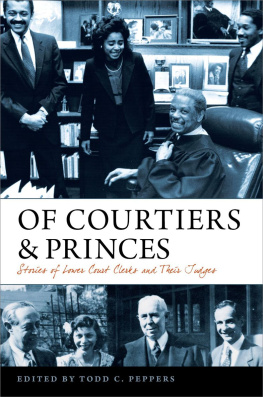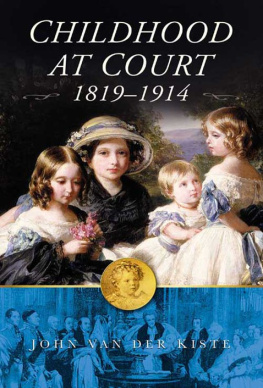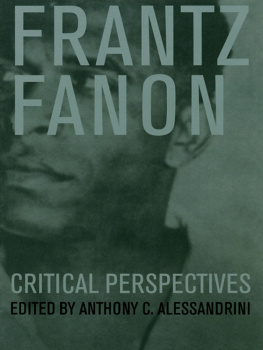MARIE MADELEINE DE BRINVILLIERS
Table of Contents
I. HER LIFE
Table of Contents
IN the judicial annals of France there has never been a more striking or celebrated figure than the Marquise de Brinvilliers. The enormity of her crimes, the brilliance of her rank, the circumstances accompanying her trial and deaththe story of which, as told by her confessor, the abb Pirot, is one of the masterpieces of French literaturefinally, the strange energy of her character, which after her execution caused her to be regarded as a saint by a portion of the population of Paris: all these things will for long years to come attract to her the attention of all who are interested in the history of the past.
Michelet devoted to the Marquise de Brinvilliers a study in the Revue des Deux Mondes. But his story is very inaccurate and leaves many gaps. From the historical point of view, the little novel of Dumas is much to be preferred. The beautiful criminal has also been dealt with by Pierre Clment in his Police of Paris under Louis XIV, and more recently by Matre Cornu, in his discourse at the reopening of the lecture-term of the advocates to the Court of Cassation. The writer of the following pages has been able to make use of some fresh documents.
In the trial of the Marquise de Brinvilliers there is much to interest the historian. It was the first of the terrible poison cases which caused such a sensation at the court of Louis XIV in the central years of his reign, and in which the greatest names in France were implicated; and Madame de Brinvilliers herself represents the most salient and most easily studied features of a type of woman which, as we shall see, repeated itself after her even on the steps of the throne.
Marie Madeleineand not MargueritedAubray, Marquise de Brinvilliers, was born on July 22, 1630. She was the eldest of the five children of Antoine Dreux dAubray, lord of Offmont and Villiers, councillor of state, matre des requtes, civil lieutenant of the city, mayoralty, and viscounty of Paris, and lieutenant-general of the mines of France. Dreux dAubray was himself the son of a treasurer of France, originally from Soissons. Madeleine dAubray received a good education, in a literary point of view at any rate. The spelling of her letters is correct, a rare thing with the ladies of her time. Her handwriting is remarkable: bold, firm, like a mans, and such as the observer would be disposed to ascribe to an earlier period. But her religious education was entirely neglected. At her interviews with her confessor on the eve of her death she displayed an utter ignorance of the most elementary maxims of religionthose which people learn as children, and never during the whole course of their life forget.
Of moral principles she was absolutely destitute. From the age of five she was addicted to horrible vices. At seven she was only by courtesy a maiden. These are what Michelet calls a young girls peccadilloes. As time went on, she yielded herself to her young brothers. On these points her own testimony renders mistake impossible. She will show herself to have been endowed with an ardent, affectionate nature, which gave her passions command of an amazing energy; but this energy acted only under the empire of her passions, for she was powerless to resist the impressions which penetrated and ere long dominated her. She was extremely sensitive to affronts, and particularly to those which touched her pride. She was one of those natures which under good guidance are capable of heroic deeds, but which are also capable of the greatest crimes when they are wholly abandoned to evil instincts.
In 1651, at the age of one-and-twenty, Marie Madeleine dAubray wedded a young officer of the Norman regiment, Antoine Gobelin de Brinvilliers, baron of Nourar, the son of a president of the audit office. He was a direct descendant of Gobelin, the founder of the celebrated manufacture. Mademoiselle dAubray brought her husband a dowry of 200,000 livres, and as he too was wealthy, the young couple enjoyed what was for that time a large fortune.
The young marchioness was charminga pretty, sprightly woman, with large expressive eyes. She made a great impression by her frank, decided, and vivacious manner of speaking. She was of an amiable and cheerful temperament, and dreamed of nothing but pleasure. A priest endowed with great keenness of judgment, who studied the Marquise de Brinvilliers in terrible circumstances, has described her as follows:
She was naturally intrepid and of a great courage. She appeared to have been born with inclinations towards good, with an air of complete indifference, with a keen and penetrating intellect, forming clear views of things, and expressing them in words few and fit but very precise; wonderfully ready in finding expedients for getting out of a difficulty, and quick to make up her mind upon the most embarrassing questions; frivolous, moreover, with no application, uneven and inconstant, becoming impatient if the same subject were often talked about.
Her soul had something naturally greata composure in face of the most unexpected emergencies, a firmness that nothing could move, a resolution to await and even suffer death if need be.
She had thick and beautiful chestnut hair, with comely and well-rounded featuresher eyes blue, tender, and of perfect beauty, her skin extraordinarily white, her nose well-shaped enough; nothing in her countenance was unpleasing.
Sweet as her face naturally appeared, when some vexatious idea crossed her imagination she showed it plainly by a grimace that might at first sight scare you; and from time to time I noticed contortions that bespoke disdain, indignation, and scorn.
She was of a very slight and dainty figure.
To the Marquis de Brinvilliers luxury and large expenditure had become second nature; he loved gaming and pleasure generally; and his marriage was very far from banishing his joyous habits. In 1659 he formed a close intimacy with a certain Godin, known more often as Sainte-Croix, a captain of horse in the Tracy regiment, originally from Montauban, and said to be a by-blow of a noble Gascon family. Sainte-Croix was young and handsome; endowed, says a memoir of the time, with all the advantages of intelligence, and perhaps, too, with those qualities of heart under whose empire a woman rarely fails, in the long-run, to fall. In after days, Matre Vautier had to sketch the portrait of Sainte-Croix in the course of an address before the Parlement. Sainte-Croix, he said, was in poverty and distress, but he had a rare and singular genius. His countenance was prepossessing, and gave promise of intelligence. Such indeed he had, and of such sort as to give universal pleasure. He took his pleasure in the pleasure of others; he entered into a religious scheme as joyfully as he accepted the suggestion of a crime. Keenly sensitive to insult, he was susceptible to love, and in love jealous to madness, even of persons on whom public debauchery assumed rights that were not unknown to him. His extravagance was amazing, and supported by no occupation; for the rest, his soul was prostituted to every form of crime. He dabbled also in external piety, and it has been claimed that he wrote devotional books. He spoke divinely of the God in whom he did not believe, and favoured by this mask of piety, which he never removed save with his friends, he appeared to participate in good deeds while really immersed in crime. Though he was an officer and married, Sainte-Croix sometimes assumed the garb and the title of Abb.











